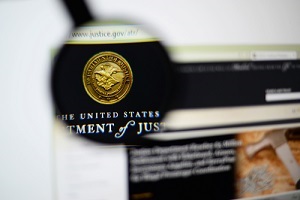A key focus of the Justice Department is prosecuting and deterring elder fraud and abuse. In the words of Attorney General Merrick Garland, “Every year, millions of older adults experience some form of elder abuse, neglect, financial exploitation, or fraud. … Holding to account those individuals and organizations that engage in elder fraud or abuse is the cornerstone of the Department’s elder justice work.”
The types of frauds and abuses against elder people run the gamut from lottery scams, where fraudsters try to trick elder people into paying them money; to kickback schemes involving patients of skilled nursing facilities; to healthcare fraud where providers receive Medicare and Medicaid funds but do not provide their elder patients the healthcare services the providers were supposed to, and claimed to, provide.
According to the DOJ’s Report, “[d]uring the reporting period of July 1, 2022, to June 30, 2023, the Department pursued nearly 300 criminal and civil cases involving conduct that targeted or disproportionately affected older adults. … These cases named over 650 defendants who collectively over $1.5 billion from over 2.4 million victims.” (emphasis added).
The DOJ’s Elder Justice Report highlights the Government’s work in prosecuting and deterring these frauds. And it specifically mentions the use of the False Claims Act, a law which permits the Government and whistleblowers to bring actions to recover for frauds against the Government.
For example, the DOJ report mentions a February 2023 settlement of claims under the False Claims Act involving Saratoga Center’s nursing home residents, where federal and New York enforcers alleged that the operators “failed to adequately staff the home, and residents suffered medication errors, unnecessary falls, and the development of pressure ulcers,” and that the center “did not consistently maintain hot water throughout the facility, have an adequate linen inventory, and dispose of solid waste”:
“The U.S. Attorney’s Office for the Northern District of New York and the Civil Division’s Fraud Section, together with the New York State Office of the Attorney General’s Medicaid Fraud Control Unit, announced on February 27, 2023 that Leon Melohn, Alan ‘Ari’ Schwartz, Jefrey Vegh, and Jack Jaffa, and associated entities, agreed collectively to pay $7,168,000 to resolve allegations that they violated the False Claims Act by causing the submission of false claims to the Medicaid program for worthless services provided to Saratoga Center’s residents. Saratoga Center closed in February 2021, after the investigation was initiated.
… [U]nlicensed individuals operated Saratoga Center from February 2017 until it closed in February 2021. During that period, the United States and the State of New York contended that Saratoga Center delivered worthless services to residents, and its physical conditions deteriorated to such a degree that it violated federal and state regulations. Specifically, the operators failed to adequately staff the home, and residents suffered medication errors, unnecessary falls, and the development of pressure ulcers. Additionally, Saratoga Center did not consistently maintain hot water throughout the facility, have an adequate linen inventory, and dispose of solid waste.
As part of the settlement, each individual and their associated entities agreed to voluntary exclusion from federal healthcare programs, for at least ten years.”
We previously cited this settlement here.
The DOJ Report also mentioned a False Claims Act case it brought against American Health Foundation, its affiliate, and three affiliated nursing homes — “Cheltenham Nursing & Rehabilitation Center (Cheltenham), The Sanctuary at Wilmington Place (Wilmington Place) and Samaritan Care Center and Villa (Samaritan)” — alleging they “provid[ed] grossly substandard skilled nursing services”:
“In its complaint, the United States alleged that the three AHF nursing homes provided grossly substandard services that failed to meet required standards of care in various ways. For example, the United States alleged that the defendant facilities failed to follow appropriate infection control protocols and did not maintain adequate staffing levels. The United States also alleged that Cheltenham housed its residents in a dirty, pest-infested building; gave its residents unnecessary medications, including antibiotic, antipsychotic, anti-anxiety and hypnotic drugs; failed to safeguard residents’ personal possessions; subject residents to verbal abuse; neglected to provide residents with activities or stimulation; and failed to provide needed psychiatric care.”
False Claims Act cases often involve not only a financial fraud against the Government, but also substantial harm done to patients or other people or entities who deal with the defendant. These cases are particularly heart wrenching when they involve older people who are subject to the defendant’s fraud. As Attorney General Garland stated, the DOJ, through its elder justice initiative, “remain[s] steadfast in [its] commitment to pursue elder justice on behalf of all older Americans in the year ahead.”
Whistleblowers play an important role in preventing and stopping elder fraud and abuse. In addition to the National Elder Fraud Hotline, which the DOJ Report highlighted, whistleblowers can also bring False Claims Act cases to recover for Medicare and Medicaid frauds.
If you would like information on what it means to be a whistleblower or think you may have information relating to healthcare fraud, or fraud in managed care programs or in home health and hospice in particular, please feel free to contact us so we can connect you with a member of the Constantine Cannon whistleblower lawyer team for a free and confidential consultation.
Read More
False Claims Act
Fraud in Managed Care Programs
Healthcare Fraud
Home Health and Hospice
I Think I Have a Whistleblower Case
Contact Us Confidentially
Read DOJ Issues Elder Justice Report To Congress at constantinecannon.com






Leave A Comment